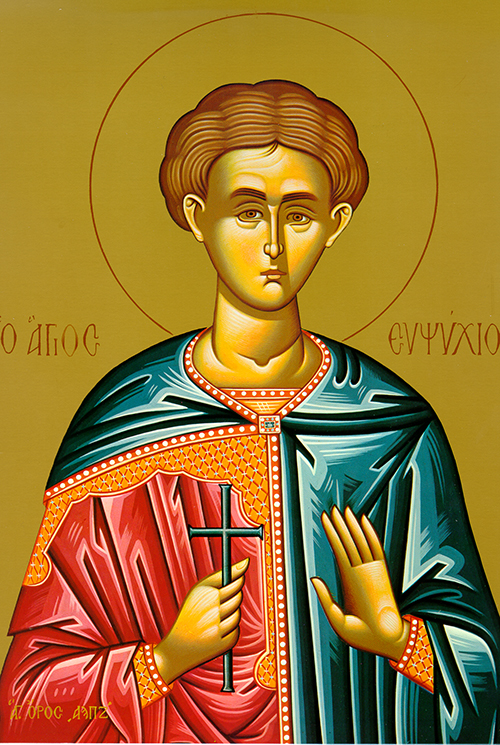

The holy martyr Eupsychius was of noble birth and was well instructed in pious beliefs. During the reign of Julian the Apostate, when St. Basil the Great governed the Church of God in Caesarea, Eupsychius entered into marriage with a prominent maiden. But alas, it was not given to him to live even one day in marriage. At the time of his wedding, it so happened that there was a pagan feast with sacrificial offerings to the idol Fortune. Eupsychius, with his companions, entered the temple, smashed all the idols, and even demolished the temple itself. Hearing of this, Julian became enraged and ordered that the culprits be beheaded, that many Christians be inducted into the army, that an enormous tribute be imposed upon all Christians, and that the city be deprived of it honorary name “Caesarea,” given to it by Caesar Claudius, and be called by its former name, Maza. Eupsychius was first tied to a tree and brutally tortured, then he was beheaded in the year 362.
O Lord our God, your holy martyr Eupsychius has deserved the crown of immortality on account of his good fight. Armed with your strength, he has vanquished his persecutors and crushed Satan’s dreadful might. Through his supplication, O Christ our God, save our souls.
Having accomplished heroic deeds with a good spirit, you vanquished the enemy, O martyr. You received honor and miracles from God; therefore, the whole Church of the faithful praises you, venerating your memory from age to age.
Acts 4: 1-10
In those days, while Peter and John were still addressing the crowd, the priests, the captain of the temple guard, and the Sadducees came up to them, angry because they were teaching the people and proclaiming the resurrection of the dead in the person of Jesus. It was evening by now, so they arrested them and put them in jail for the night. Despite this, many of those who had heard the speech believed; the number of men came to about five thousand.
When the leaders, the elders, and the scribes assembled the next day in Jerusalem, Annas the high priest, Caisphas, John, Alexander, and all who were of the high-priestly class were there. They brought Peter and John before them and began the interrogation in this fashion: “By what power or in whose name have men of your stripe done this?”
Then Peter, filled with the Holy Spirit, spoke up: “Leaders of the people! Elders! If we must answer today for a good deed done to cripple and explain how he was restored to health, then you and all the people of Israel must realize that it was done in the name of Jesus Christ the Nazorean whom you crucified and whom God raised from the dead. In the power of that name this man stands before you perfectly sound.”
John 3: 16-21
The Lord said, “God so loved the world that he gave his only Son, that whoever believes in him may not die but may have eternal life. God did not send the Son into the world to condemn the world, but that the world might be saved through him. Whoever believes in him avoids condemnation, but whoever does not believe is already condemned for not believing in the name of God’s only Son. The judgment of condemnation is this: the light came into the world, but men loved darkness rather than light because their deeds were wicked. Everyone who practices evil hates the light; he does not come near it for fear his deeds will be exposed, But he who acts in truth comes into the light, to make clear that his deeds are done in God.”
Icon courtesy of Jack Figel, Eastern Christian Publications – ecpubs.com
Monday, April 8 –